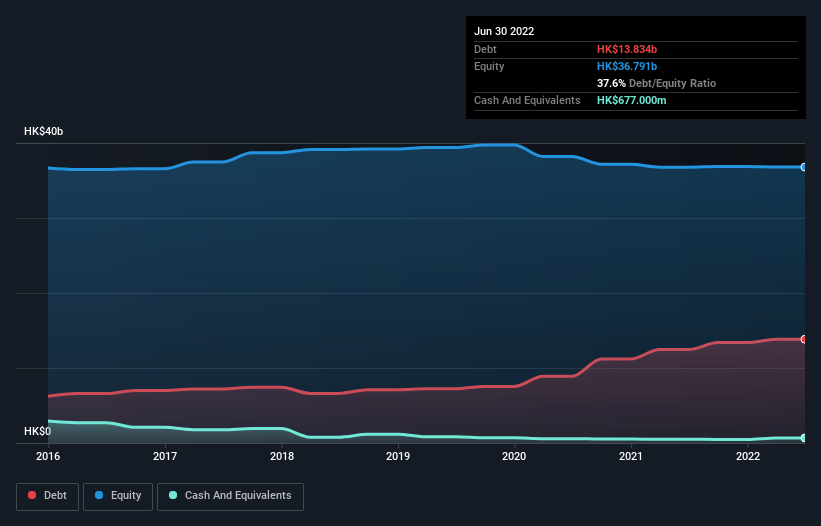David Iben put it well when he said, 'Volatility is not a risk we care about. What we care about is avoiding the permanent loss of capital.' When we think about how risky a company is, we always like to look at its use of debt, since debt overload can lead to ruin. We can see that The Hongkong and Shanghai Hotels, Limited (HKG:45) does use debt in its business. But the more important question is: how much risk is that debt creating?
What Risk Does Debt Bring?
Debt and other liabilities become risky for a business when it cannot easily fulfill those obligations, either with free cash flow or by raising capital at an attractive price. In the worst case scenario, a company can go bankrupt if it cannot pay its creditors. While that is not too common, we often do see indebted companies permanently diluting shareholders because lenders force them to raise capital at a distressed price. Of course, debt can be an important tool in businesses, particularly capital heavy businesses. The first thing to do when considering how much debt a business uses is to look at its cash and debt together.
See our latest analysis for Hongkong and Shanghai Hotels
How Much Debt Does Hongkong and Shanghai Hotels Carry?
As you can see below, at the end of June 2022, Hongkong and Shanghai Hotels had HK$13.8b of debt, up from HK$12.5b a year ago. Click the image for more detail. However, because it has a cash reserve of HK$677.0m, its net debt is less, at about HK$13.2b.

A Look At Hongkong and Shanghai Hotels' Liabilities
Zooming in on the latest balance sheet data, we can see that Hongkong and Shanghai Hotels had liabilities of HK$10.5b due within 12 months and liabilities of HK$8.48b due beyond that. On the other hand, it had cash of HK$677.0m and HK$316.0m worth of receivables due within a year. So it has liabilities totalling HK$17.9b more than its cash and near-term receivables, combined.
When you consider that this deficiency exceeds the company's HK$12.7b market capitalization, you might well be inclined to review the balance sheet intently. In the scenario where the company had to clean up its balance sheet quickly, it seems likely shareholders would suffer extensive dilution. There's no doubt that we learn most about debt from the balance sheet. But you can't view debt in total isolation; since Hongkong and Shanghai Hotels will need earnings to service that debt. So if you're keen to discover more about its earnings, it might be worth checking out this graph of its long term earnings trend.
Over 12 months, Hongkong and Shanghai Hotels reported revenue of HK$3.9b, which is a gain of 46%, although it did not report any earnings before interest and tax. With any luck the company will be able to grow its way to profitability.
Caveat Emptor
Even though Hongkong and Shanghai Hotels managed to grow its top line quite deftly, the cold hard truth is that it is losing money on the EBIT line. Indeed, it lost HK$26m at the EBIT level. When we look at that alongside the significant liabilities, we're not particularly confident about the company. We'd want to see some strong near-term improvements before getting too interested in the stock. Not least because it burned through HK$545m in negative free cash flow over the last year. So suffice it to say we consider the stock to be risky. When analysing debt levels, the balance sheet is the obvious place to start. But ultimately, every company can contain risks that exist outside of the balance sheet. For example, we've discovered 2 warning signs for Hongkong and Shanghai Hotels (1 makes us a bit uncomfortable!) that you should be aware of before investing here.
At the end of the day, it's often better to focus on companies that are free from net debt. You can access our special list of such companies (all with a track record of profit growth). It's free.
Valuation is complex, but we're here to simplify it.
Discover if Hongkong and Shanghai Hotels might be undervalued or overvalued with our detailed analysis, featuring fair value estimates, potential risks, dividends, insider trades, and its financial condition.
Access Free AnalysisHave feedback on this article? Concerned about the content? Get in touch with us directly. Alternatively, email editorial-team (at) simplywallst.com.
This article by Simply Wall St is general in nature. We provide commentary based on historical data and analyst forecasts only using an unbiased methodology and our articles are not intended to be financial advice. It does not constitute a recommendation to buy or sell any stock, and does not take account of your objectives, or your financial situation. We aim to bring you long-term focused analysis driven by fundamental data. Note that our analysis may not factor in the latest price-sensitive company announcements or qualitative material. Simply Wall St has no position in any stocks mentioned.
About SEHK:45
Hongkong and Shanghai Hotels
An investment holding company, owns, develops, and manages hotels, and commercial and residential properties in China, rest of Asia, the United States, and Europe.
Slightly overvalued with imperfect balance sheet.
Similar Companies
Market Insights
Community Narratives




